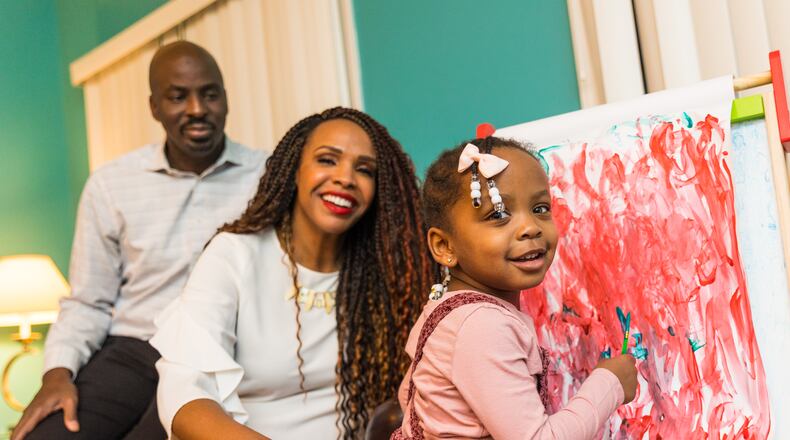Penelope Marshall McCown struggled for years to have a baby.
She and her husband, Emanuel, planned to enjoy their first year of marriage then get pregnant the next.
The year stretched into two, then four.
”Once we started, we were surprised month after month with negative, negative, negative,” said McCown, a 40-year-old Atlanta nurse practitioner .
They didn’t share their struggle with many people.
In many communities, including the Black community, there’s a stigma attached to infertility forcing many women and couples to suffer in silence.
While McCown may feel alone, she’s not. Black women are more likely to face infertility issues than white women, studies show. Now she and others are speaking up to help other African-American women learn more about the condition, treatments and options to growing a family.
A 2015 University of Michigan study focusing on African-American women of different socioeconomic backgrounds, found that, for many, not being able to have children affected their gender identity and sense of self worth.
“There was a fear of being judged for not being able to conceive and a fear of being judged for feeling depressed,” said McCown. She wondered if others would question whether her faith was strong enough to believe that God would bless them with a child.
“All the African American women — my friends — had children and conceived very, very easily.”
In October, McCown started a Facebook Live series called ”Pieces of Penelope” to raise awareness about infertility. Guests include other people struggling with infertility and experts.
In the United States about 12% of women ages 15 to 44 have difficulty getting pregnant or carrying a pregnancy to term, according to the Centers for Disease Control and Prevention. The CDC does not break down infertility data by race.
“Part of the problem with getting a precise number of the incidence of infertility in Black women is that historically, many black women were not involved in these studies, said Dr. Yetunde Ibrahim, a reproductive endocrinologist and assistant professor at the University of Texas Health Science Center in San Antonio.
In addition, some African Americans distrust the medical community.
Systemic racism may also be a factor. Studies have shown that a person’s health can decline with added stress related to racism, finances and societal issues
“Black women are less likely to present for infertility treatment although they might suffer at a higher rate,” Ibrahim said. Black health professionals are also underrepresented in the field of reproductive endocrinology.
Men can also have infertility problems.
Dr. Urania Davis, an obstetrician-gynecologist at Nile Health Care , said men are often resistant to seeking infertility treatment because “it decreases their idea of manhood. Even if they are (infertile), they don’t want to know.”
She said there are several health factors that can contribute to infertility including a history of fibroids, growths of the uterus that can cause heavy bleeding and pain, or endometriosis, a condition when tissue that normally lines the uterus grows outside the uterus.
ShaRhonda Usher, a 42-year-old Alpharetta resident, and her husband Jeremy, who has a daughter from a previous relationship, married in 2019 and immediately started trying to conceive. They were unsuccessful.
Doctors found that she had low ovarian reserves — a condition, in her case likely driven by age, that diminishes a woman’s reproductive potential.
She also had fibroids and endometriosis.
Eventually they decided to seek an egg donor. Usher got pregnant but had a miscarriage. They plan to try again this year.
Credit: HANDOUT
Credit: HANDOUT
Usher said she also felt isolated, but that pool of Black women got even smaller when she started talking about donor eggs. “People look at you funny. They want to know how you can use someone’s egg.”
Usher started a Facebook group to provide information and support, Women of Color Donor Egg/Embryo Recipient Warriors, which now has about 800 followers.
When McCown talked with her obstetrician about her concerns, she was told that she needed to see a fertility doctor.
Her mouth dropped. “I’m like, ‘What? Black people don’t do that.”
She tried pills, teas, herbal supplements. The works. Still no success.
She and her husband eventually visited a specialist. Tests didn’t show a medical reason why they couldn’t conceive. They decided to try in vitro fertilization, in which eggs are fertilized by sperm in a lab then transferred to the uterus.
The first time didn’t work. The second time she had a miscarriage in her second trimester. They didn’t try again right away.
“We needed time to heal mentally and financially,” she said. An IVF cycle can be expensive with costs ranging from $12,000 to $25,000.
Their third attempt at IVF was successful and 2019 they welcomed a daughter, Priya, who is now nearly three years old.
“She’s so amazing and so full of life and so funny,” said McCown. “Just yesterday I said to my husband that every single thing we went through was worth it just to have her.”
About the Author



